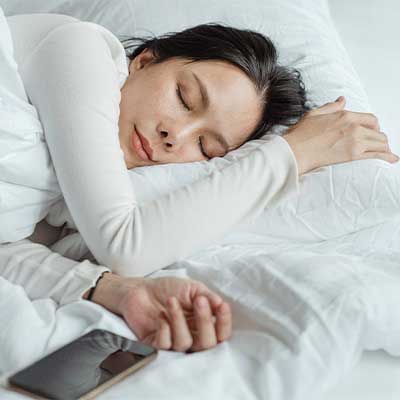Last Updated on June 7, 2024 by Ryan

Many people experience problems due to lack of sleep, and it’s not just because of a busy lifestyle or the demands of your job. There are many other contributory factors, like the recent pandemic. According to a recent survey, at least 69% of Americans have revealed that the pandemic affected their sleep patterns.
The good news is that you can use simple strategies for improving sleep quality. For instance, you can consume enough nutrition or take the best magnesium supplements for sleep.
The following are a few such strategies you can use:
Sleep Hygiene Basics
Sleep hygiene is the term used to describe the daily habits that affect sleep. It includes everything, from the bed you sleep, in to what you eat and drink before bedtime. Maintaining good sleep hygiene is important because poor sleep habits can lead to various health problems, including heart disease and diabetes.
If you’re having trouble falling asleep due to stress or insomnia, sleep hygiene can help with that, too. This benefits several people worldwide, as insomnia is a global occurrence. In fact, 1 in 3 adults globally have insomnia symptoms.
Sleep hygiene basics like having a quiet bedroom and not using electronics before going to bed can help you fall asleep faster. There are many such things that you can do as a part of your sleep hygiene.
For example, you can shower, meditate, or read a book before sleeping. This will help you wind down and get ready for rest. Therefore, it makes it easier to fall asleep at night and stay asleep throughout the night.
If sleep hygiene basics are not working, you can also rely on the best sleep supplements. For instance, you can take the best magnesium supplements for sleep. Take help from Google if required to search about what magnesium supplement is best for sleep. Relying on such natural sleep aids can help promote good quality sleep.
Nutrition and Sleep
Nutrition is strongly associated with your sleep pattern. According to an NCBI study, meal timing through different strategies can impact sleep parameters. Moreover, consuming a high-protein diet can have a positive influence on sleep. Some other influential diet factors are weight management and limiting caffeine and nicotine.
Here are some tips to have a healthy nutrition-sleep balance:
- Eat a healthy diet. Eating well and avoiding junk food is crucial, especially if you have trouble sleeping. So try to eat lots of fruits and vegetables throughout the day and lean meats like chicken or turkey breast. Try not to skip meals, either. If possible, eat breakfast within an hour of getting up.
- Avoid caffeine after noon: Caffeine has been shown to disturb sleep patterns by increasing daytime alertness and interfering with falling asleep at night.
- Don’t eat late: Eating too close before bedtime can cause indigestion, keeping you awake longer than necessary. Overeating before going down can cause heartburn/acid reflux issues, disturbing our slumber time.
Supplements can aid with sleep-related nutritional problems, too. If you are having constipation, for example, the best magnesium supplements for sleep can help you with that.
Sleep Supplements
A few supplements can be worth trying if you have been struggling with insomnia or other sleep issues. However, it’s important to remember that these supplements are more effective when paired with good sleep hygiene.
Here are some examples of supplements that can help improve your ability to fall asleep:
Magnesium Supplements
Magnesium is present in many foods, including leafy greens and nuts. The National Institutes of Health recommends that women get 310 mg and men get 400 mg daily from food sources alone. However, if you can’t get the recommended levels from food alone, try some of the best magnesium supplements for better sleep.
Magnesium helps regulate muscle and nerve function, blood sugar levels, and blood pressure. Moreover, it boosts GABA production. GABA reduces nerve cell communication to minimize anxiety and help your mind and body relax.
You can find many magnesium supplements for sleep with a simple Google search. However, it again depends on understanding which magnesium supplement is best for you. There are different types of magnesium supplements, such as magnesium citrate, magnesium glycinate, and magnesium oxide.
Magnesium glycinate is considered to be one of the most effective types for enhancing sleep. You can search for the best magnesium glycinate for sleep to find local and online sellers.
You also need to know the right dosage of magnesium for sleep. If you are not aware, consult with your doctor before taking magnesium for better sleep quality.
Melatonin Supplements
Melatonin is a hormone that helps regulate your sleep cycle. It’s produced by the pineal gland and released into your bloodstream as it gets darker, encouraging you to go to bed.
In addition to being produced naturally by your body, melatonin supplements can also treat sleep disorders like insomnia. But how much melatonin should you take for sleep? An adult who wants better quality rest may take between 2 and 6 mg before bedtime each night. According to the Sleep Foundation, the average melatonin dosage among adults is 4.8 mg.
Valerian Root Supplements
Valerian root is an herbal supplement often used to help with sleep. According to Mattress Verdict, it is a perennial herb commonly found in Europe and Asia. However, it is also easily available in North America and Canada. Valerian products contain more than 400 extracts, mainly extracted from the roots of Valeriana officinalis.
It can be purchased in capsule form, as a liquid tincture, and as tea. Some people are concerned about taking valerian root because of its safety or efficacy. But don’t worry, valerian root isn’t a drug. It contains no active ingredients like benzodiazepines or barbiturates.
Stress and Sleep
Stress can also significantly affect your sleep, as you cannot keep calm and fall asleep when stressed. Stress can cause insomnia, leading to other sleep problems like restless leg syndrome and sleep apnea.
It can lead to frequent awakenings at night, disrupting the sleep cycle. It may contribute to vivid and distressing dreams or nightmares, further impacting sleep quality.
Stress is also strongly associated with magnesium loss. Several studies have found that loss of magnesium through urine increases during stress and anxiety. For instance, magnesium levels in urine increase during exams. Similarly, a study from Springer Journal also shows that low magnesium levels can increase the risk of oxidative stress.
Hence, you can take the best magnesium for sleep to overcome stress-related sleep issues. Additionally, you can also take other supplements like melatonin or Valerian root to ensure sound sleep.
Seeking Help for Sleep Disorders
Sleep disorders are more common than you might think. It’s estimated that around 50 to 70 million Americans have chronic sleep disorders. However, only a few take medical assistance. If you have been experiencing such problems for a long time, it is wise to seek professional help.
Sleep disorders can be treated successfully with medication and behavioral therapy methods such as cognitive behavioral therapy (CBT). These treatments have been shown to improve quality of life by reducing stress levels while improving daytime functioning.
Conclusion
Getting the sleep you need is essential no matter what stage of life you’re in. Getting enough sleep every night has many benefits, from helping you lose weight and improve your mood to improving your memory.
So, if you’ve been struggling with insomnia or want some tips to get a more restful slumber, we hope these ideas will help. You can try changing your diet, creating sleep hygiene, and taking the best magnesium supplements for sleep.
Are Tampons Safe? What You Need to Know and Safer Alternatives | 2024
A recent study published in Environmental International has…
Transform Your Life: Discover the Secret to Feeling Your Best Self
Whether you’re working overtime or just a busy…
Foods to Eat on Your Period That Doctors Don’t Want You to Know About: Say Goodbye to Cramps & Mood Swings!
Foods to Eat on Your Period That Help…
Exercises To Do When Recovering From A Soft Tissue Injury
Have a soft tissue injury and are wondering…
Which form of magnesium is best for sleep?
Since it may aid in relaxing your muscles and neurological system, magnesium glycinate is thought to be the most beneficial form of magnesium for improving sleep. This supplement is appropriate for people looking for a dietary supplement for both sleep and general use because it has no additional ingredients.
Is magnesium citrate or glycinate better for sleep?
Due to its capacity to reduce body temperature, relax muscles, and calm the central nervous system, magnesium glycinate is widely regarded as the ideal form of magnesium to take before bed in order to help sleep.
Is it OK to take magnesium every night for sleep?
Magnesium may assist in calming the bodily nerves that keep people awake. While melatonin has been shown to be effective in treating some sleep disorders, a doctor may not advise taking magnesium unless there is another reason, such as signs of low magnesium levels.



